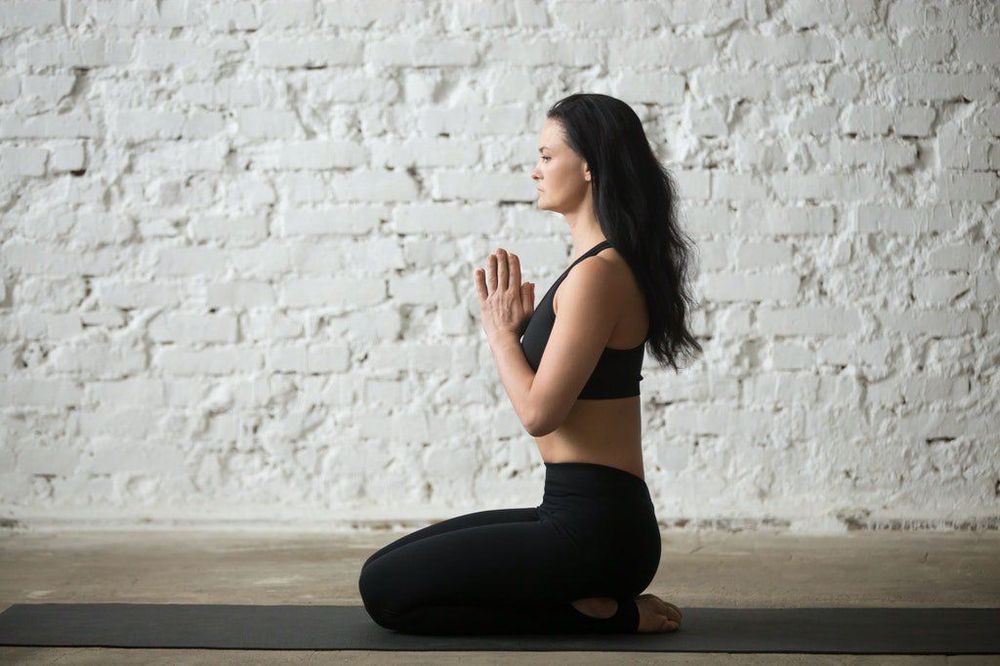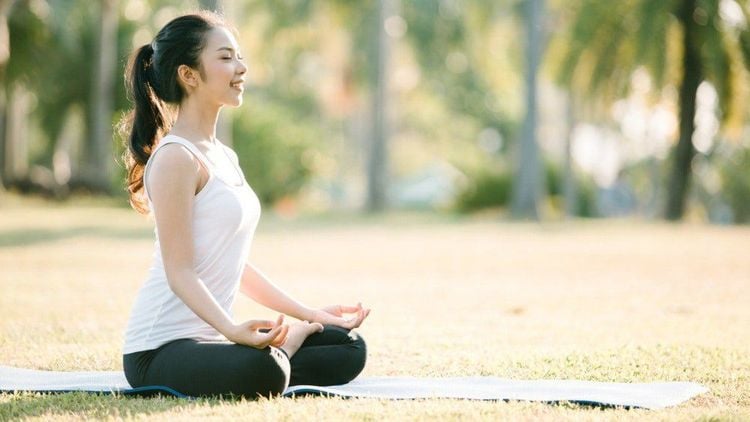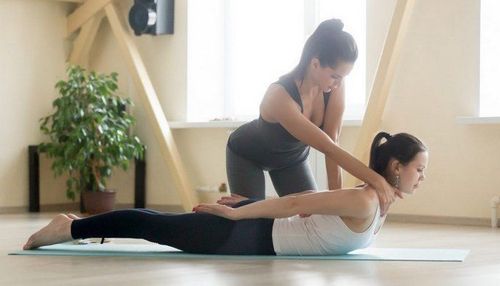This is an automatically translated article.
Anyone can practice meditation because meditation is simple and inexpensive, and it doesn't require any special equipment. What's more, you can practice meditation wherever you are, whether you're walking, taking the bus, waiting at the doctor's office, or even in the middle of a difficult business meeting. The article will help you understand meditation and 12 benefits of meditation based on science.1. What is meditation?
Meditation can relieve stress and bring inner peace to your mind. If stress makes you anxious, and anxious, try meditation. Spending just a few minutes in meditation can restore your calm and inner peace.Previously, meditation helped deepen understanding of the sacred and mystical forces of life. On any other day, meditation is used for relaxation and stress relief. Meditation is considered a tonic for the mind and body.
While meditating, you should focus your attention and get rid of the flurry of thoughts that can make your mind pent up and cause stress. This process can lead to enhanced physical and emotional health. You can use meditation to develop other beneficial habits and feelings, like a positive mood and outlook, self-discipline, healthy habits, and even increased pain tolerance.
There are 7 popular types of meditation in the world:
Mindfulness meditation Body scanning meditation (progressive relaxation) Mindfulness meditation Kundalini breathing awareness meditation (Physical activity meditation that combines movements with deep breathing and mantra) Zen meditation Transcendental meditation.

2. 12 benefits of science-based meditation
2.1. Reduce stress
This is considered to be one of the most common reasons people want to start with meditation. Normally, mental and physical stress increases levels of the stress hormone cortisol. This produces many of the harmful effects of stress such as the release of inflammatory chemicals called cytokines-CRS.These effects can disturb your sleep, promote depression and anxiety, raise blood pressure, contribute to fatigue and negative thinking.
In an 8-week study, a style of meditation called “mindfulness meditation” reduced the inflammatory response caused by stress
Furthermore, research has shown that meditation can also improve symptoms of stress-related conditions, including irritable bowel syndrome, post-traumatic sleep disorder, and fibromyalgia.
Trắc nghiệm: Bận rộn có ảnh hưởng đến sức khỏe của bạn không?
Cuộc sống hiện đại khiến chúng ta vì quá bận rộn mà quên chăm sóc sức khỏe cho chính mình. Ai cũng biết rằng lịch trình làm việc cả ngày có thể khiến bạn kiệt sức, nhưng cụ thể bận rộn ảnh hưởng thế nào tới sức khỏe? Hãy cùng làm thử bài trắc nghiệm dưới đây.
2.2. Control anxiety
Meditation can help reduce stress levels, helping to reduce anxiety.A meta-analysis including nearly 1,300 adults found that meditation can help reduce anxiety. Notably, this effect was strongest in those with the highest anxiety levels. In addition, one study found that 8 weeks of mindfulness meditation reduced anxiety symptoms in people with generalized anxiety disorder, along with increased positive statements about themselves and improved self-esteem. ability to react and cope with stress.
Another study in 47 people with chronic pain found that completing an 8-week meditation program led to significant improvements in depression, anxiety, and pain over the course of 1 year.
For example, yoga has been shown to help people reduce stress and anxiety. This may be due to the benefits from both meditation practice and physical activity. Meditation can also help you manage work-related anxiety. One study found that employees who used a mindfulness meditation app for eight weeks had improved feelings of happiness, reduced anxiety, and less stress at work compared to those in a control group.
2.3. Promote emotional health
Certain forms of meditation can help you improve your self-image and have a more positive outlook on life.For example, a review of treatments performed on more than 3,500 adults found that mindfulness meditation improved symptoms of depression.
Similarly, a review of 18 studies found that those who received meditative therapies reduced depressive symptoms, compared with those in the control group.
Another study found that people who completed a meditation exercise had fewer negative thoughts when viewing negative images, compared with those in the control group
Furthermore, inflammatory chemicals are considered to be Cytokines, which are released in response to stress, can affect mood, leading to depression. A review of several studies found that meditation may also help reduce depression by reducing levels of these inflammatory chemicals.

2.4. Raise self-awareness
Certain forms of meditation can help you better understand yourself, helping you to develop into your best self.For example, meditation helps you better understand yourself and how you relate to those around you.
Other forms of making you realize your limits. With meditation, you become more aware of your thought habits, and can direct them toward more constructive patterns.
A review of 27 studies found that practicing tai chi may be associated with improved self-efficacy, a term used to describe a person's belief in one's own abilities or abilities ability to overcome challenges
In another study, 153 adults who used a mindfulness meditation app for 2 weeks reduced feelings of loneliness and increased social contact compared to humans in a control group
In addition, the meditative experience can be enriched with creative problem-solving skills.
2.5. Extended attention span
Mindfulness meditation is like upgrading your attention span. Meditation helps increase the strength and endurance of your attention.For example, one study found that people who listened to a meditation tape improved their attention and accuracy while completing tasks, compared to those in a control group.
A similar study found that people who regularly practice meditation perform better on visual tasks and have a higher ability to focus than those who do not have any meditation experience.
Furthermore, one review concluded that meditation can even reverse patterns in the brain that contribute to lightheadedness, anxiety and poor attention
Even if you just meditate for a period of time Short each day can also benefit you. One study found that meditating for just 13 minutes a day boosted attention and memory by eight weeks.
2.6. May reduce memory loss in the elderly
Improving your attention span can help keep your mind fresh.Kirtan Kriya is a method of meditation that combines a mantra or chanting with repetitive movements of the fingers to focus your thoughts. Studies in people with age-related memory loss have shown it to improve performance on neuropsychological tests.
Furthermore, one review found preliminary evidence that a variety of meditation styles can enhance attention, memory, and mental alertness in elderly volunteers
In addition to combating dementia With common age-related memory loss, meditation can at least partially improve the memory of dementia. It can also help manage stress and improve morale in family members with dementia.
2.7. Can create kindness
A type of meditation called loving-kindness meditation can increase positive feelings and actions toward yourself and others.Through practice, people learn to extend kindness and be able to forgive first friends, then acquaintances, and finally enemies.
A meta-analysis of 22 studies on this form of meditation demonstrated its ability to help increase people's compassion for themselves and others.
A study in 100 adults randomly assigned to a program that included loving-kindness meditation found that these benefits depend on how much time you spend meditating and how effective it is.
In other words, the more time people spend in weekly loving-kindness meditation practice, the more positive feelings they experience
Another study in 50 college students found that loving-kindness meditation practice 3 times per week improves positive emotions, interpersonal interactions and understanding of others in just 4 weeks
These benefits will accrue over time.
2.8. Can help with addiction
Your self-discipline developed through meditation can help you break dependence by enhancing self-control and becoming aware of addictive factors.Research has shown that meditation can help people learn to redirect attention, manage their emotions and impulses, and increase understanding of the causes behind.
A study in 60 people treated for alcohol use disorder found that transcendental meditation practice was associated with reduced levels of stress, psychological distress, cravings and alcohol use after 3 month
Meditation can also help you control your cravings. A review of 14 studies found that mindfulness meditation helped participants reduce cravings.
2.9. Improve sleep
Almost half of the world's population will struggle with insomnia at some point. One study compared mindfulness-based meditation programs and found that meditators slept longer and improved the severity of their insomnia, compared with those with insomnia who applied these techniques. other remedies for insomnia.Meditation mastery can help you control or redirect the racing or fleeing thoughts that often lead to insomnia. In addition, it can help relax your body, release stress and put you in a peaceful state, making it easier for you to fall asleep and sleep more deeply.

2.10. Pain control
Your perception of pain is related to your mental state and it can increase under stressful conditions.Some research shows that incorporating meditation into your routine can be beneficial for pain management.
For example, a review of 38 studies concluded that mindfulness meditation can help reduce pain, improve quality of life, and reduce symptoms of depression in some people with chronic pain.
A large meta-analysis of studies involving nearly 3,500 participants concluded that meditation is associated with pain relief
Meditating and non-meditators both experience the same causes of pain, but those who practice meditation show a greater ability to cope with pain and may even reduce pain sensation.
2.11. Can lower blood pressure
Meditation can improve physical health by reducing stress on the heart.Over time, high blood pressure makes the heart work harder to pump blood, which can lead to poor heart function. High blood pressure also contributes to atherosclerosis or narrowing of the arteries, which can lead to heart attack and stroke.
A meta-analysis of 12 studies involving nearly 1000 participants found that meditation helps lower blood pressure. This would be more effective in older volunteers and those with higher blood pressure before the study.
In part, meditation controls blood pressure by relaxing nerve signals that regulate heart function, vascular tension, and the "fight or flight" response that increases alertness in situations stress
2.12. Can be done anywhere
You can do meditation anywhere in just a few minutes. If you want to start meditating, choose one of these two styles of meditation:Attention Meditation. This style needs to focus attention on a single object, thought, sound or image. It emphasizes removing your mind from troubles. Meditation can focus on your breathing, mantras, or calming sounds. Meditation open supervision. This style encourages expanding awareness of all aspects of the environment, training thinking and sense of self. It may include awareness of repressed thoughts, feelings, or impulses. If your work or home environment doesn't allow for some stable and quiet alone time, consider taking a meditation class. This will also improve your chances of success as you will receive more structured guidance and support.
Also, consider setting your alarm a few minutes early to take advantage of the quiet time each morning. Doing this can help you form consistent habits and allow you to start your day on a positive note
There are many different types of meditation, each with different strengths and benefits. Choosing a meditation style that works for you is a great way to improve the quality of your life, even if you only have a few minutes to meditate each day.
Please dial HOTLINE for more information or register for an appointment HERE. Download MyVinmec app to make appointments faster and to manage your bookings easily.
References: mayoclinic.org, healthline.com












